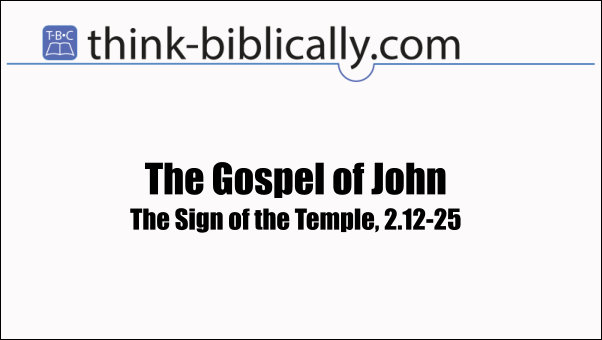By Tyson Thorne

From Cana Jesus, Mary, James and other brother's of Jesus as well as the disciples all traveled to Capernum (16 miles) for a few days before continuing on to Jerusalem (85) miles for the Passover. There has been much debate over verse 12 since Catholics adhere to the eternal virginity of Mary. What did John "really mean" by Jesus's "brothers"? Epiphanius (an early church father) argued they were children of Joseph by a previous marriage; Jerome argued they were cousins; Heldivian argued the obvious, that they were the children of Mary and Joseph born after Jesus. Sometimes a brother is just a brother.
The fact that it was near Passover is important to the story. During Passover everyone had to present a sin offering, for some a lamb but for the poor a dove would do. The point was that everyone participated so that they might understand how serious their sin is. While we may now live under grace (which is far superior to the law), I fear we have lost sight of the seriousness of sin. Because the animals were to be sacrificed in the temple, some felt it best to sell the animals in the temple. There was less distance to carry them to their final destination. And since Jews came from all over — Jerusalem, Egypt and portions of the Middle East — money changers (currency converters) would be necessary for the sale to take place. The end result is that the outer courts of the temple were turned into a market.
One doesn't need to imagine what Jesus thought of these practical arrangements. In verse 15 we see Jesus make something like a whip from cords with which he drove out the animals and their keepers. He then overturned the tables where the money changers were doing business. Turning to the dove keepers he commanded, "Take these things away from here! Do not make my Father’s house a marketplace!” Jesus acted out of righteous anger, but there is more going here than zeal for the house of God. Zechariah describes a day in the Messianic kingdom when there will no longer be a marketplace in the house of the Lord. Jesus's actions were a sign that most Jews would recognize, a sign that the Messiah had come.
Ironically, immediately following this sign the religious leaders ask for another. Anyone can drive out the merchants if they had the courage and the will. They wanted Jesus to prove his claim, that he was indeed the Messiah. "Destroy this temple," Jesus said (and I like to think he used his hand to point to his chest), "and in three days I will raise it up again." Of course they misunderstood, believing he was speaking about the physical temple they were in. It may be that the disciples misunderstood as well, at least at the time, but they would remember this day after the resurrection.
The result of this encounter was the faith of many throughout Jerusalem. Even though they believed he was the Messiah, Jesus wasn't willing to tell them outright (verse 25). He knew the heart of man is desperately wicked. For now, the signs would speak for him.
